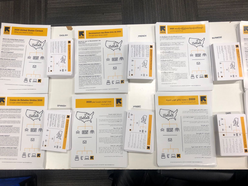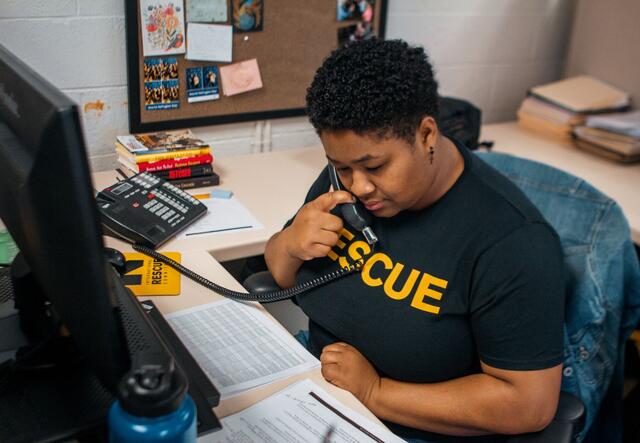U.S. census: How to make sure everyone counts despite COVID-19
Key decisions that will affect how the U.S. responds to future crises depend on an accurate census.
Key decisions that will affect how the U.S. responds to future crises depend on an accurate census.
Despite widespread disruption in the United States due to the COVID-19 pandemic, the 2020 census has begun. Every 10 years, the U.S. government aims to count every person living in the country. This year’s count began for the entire country in mid-March.
This census poses a unique challenge. As the U.S. responds to the COVID-19 pandemic, many events and public places are closed and we are all focused on keeping our families and communities safe.

Even in this environment, the census is important. For refugees and new Americans, it is one of the first ways they can participate in American civic life, even before they become citizens and vote. The outcome determines how much federal money will be allocated to any given community for essentials such as hospitals, schools, transportation, and housing. It is also used to determine representation in Congress and to enforce civil-rights protections. If a population is undercounted, the entire community could lose access to crucial resources—including resources needed during a crisis—and diminish its voice regarding decisions that impact them for the next ten years.
That’s why, even as IRC’s teams focus on immediate public health threats, we continue to work hard to ensure everyone—including refugees and new Americans—is counted. Learn more about why the census is crucial for new Americans and what the IRC is doing to help, even in the face of COVID-19. If you live in the U.S. and haven’t already, be sure to fill out your own Census form online here.
Editor’s note, July 21, 2020: The U.S. Administration announced an Executive Order to exclude undocumented immigrants from 2020 U.S. Census data used to determine Congressional representation. The move comes despite an earlier Supreme Court decision rejecting the inclusion of a citizenship question in the Census and despite a requirement in the U.S. Constitution that everyone be counted. It has the potential to disenfranchise thousands of communities when it comes to their representation in Congress.
“All our clients have the right and the responsibility to be counted by the Census,” says Hans Van de Weerd, the IRC’s vice president of Resettlement, Asylum, and Integration.
As a trusted refugee and immigrant community service provider, the IRC continues to work in local communities to ensure a fair and accurate Census. Read more below to find out how this critical work continues during the COVID-19 pandemic.
Every single adult and child, regardless of immigration status. Each household is required by law to fill out a census form; everyone who arrived or was born in the U.S. on or before April 1, 2020 must be counted.
“If a baby is born on March 31, you better count that baby!” says Tatjana Andrews, an IRC staff member and former refugee herself leading the IRC’s Salt Lake City census work.
The census is short and easy to fill out. The U.S. government asks about the number of people living at an address, if someone living there owns or rents the home, and for a phone number. For each person living at the address, the government asks for their name, how often they live at the address, what their relationship is to others in the household, and for their gender, age, date of birth, and race. The census does not ask for anyone’s Social Security number or financial information, nor does it ask about immigration status or citizenship.
Yes, the census is secure. It is illegal for the government to share the personal information provided for the census with anyone, including law enforcement and other government officials.
Many refugees have left their native countries because of political persecution and often being surveyed by the government they fled was to be avoided rather than embraced. It is important that refugees know that the U.S. census is safe and secure.
Confusion regarding the 2020 census arose when the Trump administration attempted to add a question about citizenship to the form. Experts argued that the addition would lead to an undercounting of immigrants and several organizations sued to have the question removed. It is important to spread the word that there is not a question about citizenship on the census.
If you don’t count a child now, they will lose out on resources for the majority of their childhood.
Resources and political representation for the next 10 years will be based on all community members counted in this year’s census, including refugees and other new Americans. As Andrews says, “If you don’t count a child now, they will lose out on resources for the majority of their childhood.”
Federal money allocated to communities for health care and hospitals are good examples of census outcomes. Andrews emphasizes concrete governmental changes, like the fact that the state of Utah gained a representative after the 2010 Census.
“It is so important that new Americans...know that they can truly make an impact in their community right away by participating in the census,” Andrews says.
Trusted messengers like the IRC build confidence among refugees and immigrants; emphasizing the importance of the 2020 census ensures these populations understand that their participation in the census is safe and secure.
Staff members across the U.S. have been trained to incorporate census information into their communications with clients; we have been integrating census education into citizenship classes, naturalization workshops, and cultural orientations. In addition, the IRC has created unique tools, including a video, aimed at making sure new Americans understand the importance of the census. Before offices moved to remote work due to COVID-19, many also had planned for a “Census kiosk” set up so clients could fill it out online while attending appointments.

Prior to the coronavirus pandemic, some of the IRC’s census work relied on in-person communications in our offices, at community events, or in public spaces like libraries. Because of the pandemic, many of those spaces and events are now closed. As communities practice social distancing, census teams have moved their focus to employing remote outreach, such as setting up a phone bank.
Fortunately, it has never been easier to complete the census at home—whether that’s online, by phone, or through the mail. In fact, this is the first time that the census is available online.
“More than ever, we rely on our trained volunteers to conduct outreach to our clients, calling and informing clients why they should respond to the census by phone, mail or online.” says Rachel Tang, the IRC’s census outreach coordinator for Los Angeles, Calif.
IRC staff members are also using text messages and the mail to ensure clients know about the census; we are posting about the census on social media accounts, and holding workshops and information sessions on Zoom and ther video conferencing services.
They are also getting creative by incorporating census work into COVID-19 community support programs—even, in one case, exploring adding census materials to lunches handed out to school kids.
“In light of the new challenges with COVID-19, the social service programs that relieve crises and the decisions our representatives make have a direct impact on the community we serve,” said Tang, “In times of uncertainty, our community relies on us to be advocates for them as well as teaching them to be advocates for themselves. Encouraging our clients’ participation in the 2020 census is an essential tool for making their voices heard.”
First, make sure your household has filled out the census. You can do so here.
Act as a trusted messenger in your community—share this article and get the facts out about the census and its importance.